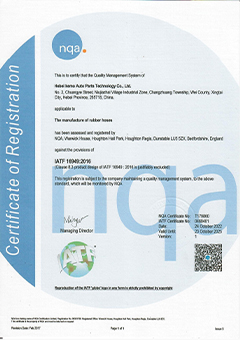hydraulic power steering line
Nov . 21, 2024 04:42 Back to list
hydraulic power steering line
Understanding Hydraulic Power Steering Systems
Hydraulic power steering (HPS) systems have become a fundamental component of modern vehicles, enhancing steering control and overall driving experience. This technology utilizes hydraulic fluids to assist in the steering process, significantly reducing the driver's physical effort required to steer, especially in larger vehicles. In this article, we will explore the components, functioning, advantages, and potential issues related to hydraulic power steering systems.
Components of Hydraulic Power Steering Systems
The basic architecture of a hydraulic power steering system consists of several key components
1. Steering Wheel The driver initiates the steering input through the steering wheel. 2. Steering Column This connects the steering wheel to the steering gear.
3. Steering Gear It converts the rotational motion of the steering wheel into linear motion to turn the wheels.
4. Hydraulic Pump Driven by the vehicle’s engine, this pump generates hydraulic pressure by circulating hydraulic fluid.
5. Hydraulic Fluid A specialized fluid that transmits force within the system. It also lubricates the components and helps dissipate heat.
6. Hoses and Lines These carry the hydraulic fluid between the pump, steering gear, and reservoir.
7. Control Valves These direct the flow of hydraulic fluid, allowing for better steering response.
8. Reservoir This stores excess hydraulic fluid required by the system.
How Hydraulic Power Steering Works
The operation of a hydraulic power steering system begins when the driver turns the steering wheel. The steering column then rotates the steering gear, which directs the hydraulic fluid from the pump through the hoses to the steering gear. The flow of hydraulic fluid helps amplify the driver’s effort, making it easier to turn the steering wheel.
The hydraulic pump supplies pressurized fluid, while the control valves adjust the fluid flow based on steering input. As the driver applies more force to the wheel, the system diverts more fluid to assist in steering, thereby offering responsive and precise control of the vehicle’s direction. This system not only aids in turning but also provides feedback to the driver for improved road feel.
hydraulic power steering line

Advantages of Hydraulic Power Steering
Hydraulic power steering systems offer numerous advantages
- Reduced Effort Drivers experience less physical strain when steering, especially in scenarios requiring frequent directional changes or maneuvering at low speeds.
- Enhanced Control The system provides better feedback and a more connected feel to the road, contributing to improved handling and control of the vehicle.
- Adaptability These systems can be tuned for different vehicle types, enhancing maneuverability in both sports cars and heavy-duty trucks.
Potential Issues and Maintenance
While hydraulic power steering systems are generally reliable, they can encounter problems
- Fluid Leaks One of the most common issues, often visible as fluid pooling beneath the vehicle. Regular checks can help detect leaks early.
- Pump Failure The hydraulic pump may wear out over time, leading to increased steering effort or noise.
- Aeration of Fluid Air in the hydraulic system can lead to a spongy steering feel. Bleeding the system can remove excess air.
- Worn Components Hoses, seals, and other components can wear out, leading to inefficiency or failure of the steering assistance.
Conclusion
Hydraulic power steering has revolutionized the driving experience by making steering easier and more responsive. Understanding its components, functionality, and maintenance needs can help drivers appreciate their vehicle's design and performance. Keeping an eye out for potential issues and performing regular maintenance can ensure a reliable and enjoyable driving experience for years to come. As technology continues to evolve, the principles of hydraulic power steering remain an important foundation for future advancements in vehicle control systems.
